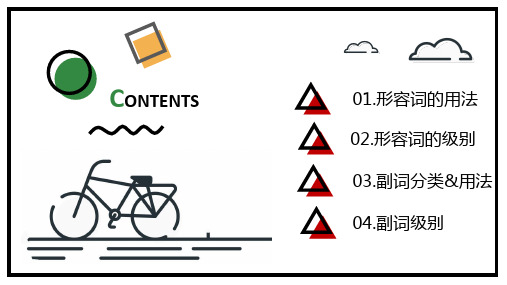高中英语形容词、副词讲解(共45张PPT)
合集下载
高中英语语法:形容词和副词(共61张PPT)

A commercial advertisement is one which someone has paid for to promote a product or service.商业广告是一种人们推销某商品或服务而花钱做的 广告。 (2)多个形容词修饰同一名词时的顺序。 要根据它们与名词的关系的密切程度来确定先后位置,一般来说,关 系越密切的越靠近名词。 a unique Olympic torch relay一次别开生面的奥运圣火接力传递。(限 定 描述 出处 用途 名词) a beautiful white Chinese peacock一只美丽的中国白孔雀。(限定 描 述 颜色 出处 名词)
二、形容词和副词的位置
(2)多个形容词修饰同一名词时的顺序。 要根据它们与名词的关系的密切程度来确定先后位置,一般来说,关 系越密切的越靠近名词。 his small new black foreign car他的那辆新的黑色的国外小汽车(限定 大小 新旧 颜色 出处 名词) a fine old stone bridge一座漂亮的石孔桥(限定 描述 新旧 材料 名词) several sour green eating grapes几枚酸绿的食用葡萄(数量 描述 颜 色 用途 名词) This is his big square old black Chinese writing desk.这就是他的又大又 旧的中国式黑色方形写字台。
一二、介 形词 容的 词分 和类副词的位置
2.副词的位置
(1)修饰动词时。 ①程度副词(almost, nearly, rather, fairly等)、频率副词(always, never, often, seldom等)一般放在实义动词之前,be动词、助动词和情态动词后。 In his blind haste he almost ran into the river.他匆匆忙忙地几乎跑到河里去了。 (程度副词almost位于run前。) On Saturday, he seldom stays in the house.星期天他很少待在家里。(频率副词 seldom位于stay前。) I reckon that he is rather too old to marry again.我认为他的年龄太大,不太适于 再婚。(程度副词rather位于系动词后。) You’ve always been my close friend.你一直是我亲密的朋友。(频率副词 always位于第一个助动词之后。)
二、形容词和副词的位置
(2)多个形容词修饰同一名词时的顺序。 要根据它们与名词的关系的密切程度来确定先后位置,一般来说,关 系越密切的越靠近名词。 his small new black foreign car他的那辆新的黑色的国外小汽车(限定 大小 新旧 颜色 出处 名词) a fine old stone bridge一座漂亮的石孔桥(限定 描述 新旧 材料 名词) several sour green eating grapes几枚酸绿的食用葡萄(数量 描述 颜 色 用途 名词) This is his big square old black Chinese writing desk.这就是他的又大又 旧的中国式黑色方形写字台。
一二、介 形词 容的 词分 和类副词的位置
2.副词的位置
(1)修饰动词时。 ①程度副词(almost, nearly, rather, fairly等)、频率副词(always, never, often, seldom等)一般放在实义动词之前,be动词、助动词和情态动词后。 In his blind haste he almost ran into the river.他匆匆忙忙地几乎跑到河里去了。 (程度副词almost位于run前。) On Saturday, he seldom stays in the house.星期天他很少待在家里。(频率副词 seldom位于stay前。) I reckon that he is rather too old to marry again.我认为他的年龄太大,不太适于 再婚。(程度副词rather位于系动词后。) You’ve always been my close friend.你一直是我亲密的朋友。(频率副词 always位于第一个助动词之后。)
高中英语语法形容词和副词全解30页PPT

高中英语语法形容词和副词全解
6
、
露
凝
无
游
氛
,
天
高
风
景
澈
。
7、翩翩新 来燕,双双入我庐 ,先巢故尚在,相 将还旧居。
8
、
吁
嗟
身
后
名
,
于
我
若
浮
烟
。
9、 陶渊 明( 约 365年 —427年 ),字 元亮, (又 一说名 潜,字 渊明 )号五 柳先生 ,私 谥“靖 节”, 东晋 末期南 朝宋初 期诗 人、文 学家、 辞赋 家、散
文 家 。汉 族 ,东 晋 浔阳 柴桑 人 (今 江西 九江 ) 。曾 做过 几 年小 官, 后辞 官 回家 ,从 此 隐居 ,田 园生 活 是陶 渊明 诗 的主 要题 材, 相 关作 品有 《饮 酒 》 、 《 归 园 田 居 》 、 《 桃花 源 记 》 、 《 五 柳先 生 传 》 、 《 归 去来 兮 辞 》 等 。
1
0
、
倚
南
窗
以
寄
傲
,
审
容
膝
之
易
安
。
41、学问是异常珍贵的东西,从任何源泉吸 收都不可耻。——阿卜·日·法拉兹
42、只有在人群中间,才能认识自 己。——德国
43、重复别人所说的话,只需要教育; 而要挑战别人所说的话,则需要头脑。—— 玛丽·佩蒂博恩·普尔
44、卓越的人一大优点是:在不利与艰 难的遭遇里百折不饶。——贝多芬
45、自己的饭量自己知道。——苏联
6
、
露
凝
无
游
氛
,
天
高
风
景
澈
。
7、翩翩新 来燕,双双入我庐 ,先巢故尚在,相 将还旧居。
8
、
吁
嗟
身
后
名
,
于
我
若
浮
烟
。
9、 陶渊 明( 约 365年 —427年 ),字 元亮, (又 一说名 潜,字 渊明 )号五 柳先生 ,私 谥“靖 节”, 东晋 末期南 朝宋初 期诗 人、文 学家、 辞赋 家、散
文 家 。汉 族 ,东 晋 浔阳 柴桑 人 (今 江西 九江 ) 。曾 做过 几 年小 官, 后辞 官 回家 ,从 此 隐居 ,田 园生 活 是陶 渊明 诗 的主 要题 材, 相 关作 品有 《饮 酒 》 、 《 归 园 田 居 》 、 《 桃花 源 记 》 、 《 五 柳先 生 传 》 、 《 归 去来 兮 辞 》 等 。
1
0
、
倚
南
窗
以
寄
傲
,
审
容
膝
之
易
安
。
41、学问是异常珍贵的东西,从任何源泉吸 收都不可耻。——阿卜·日·法拉兹
42、只有在人群中间,才能认识自 己。——德国
43、重复别人所说的话,只需要教育; 而要挑战别人所说的话,则需要头脑。—— 玛丽·佩蒂博恩·普尔
44、卓越的人一大优点是:在不利与艰 难的遭遇里百折不饶。——贝多芬
45、自己的饭量自己知道。——苏联
形容词和副词(共19张PPT)

04
形容词和副词的特殊用法
形容词的特殊用法
形容词作名词
形容词的比较级和最高级
某些形容词可以作为名词使用,如“ 幸福”、“成功”等,表示一种状态 或结果。
形容词有比较级和最高级的用法,用 于描述程度或数量的差异,如“更快 ”、“最高”等。
形容词修饰名词
形容词可以放在名词前面,用来描述 名词的特征或属性,如“美丽的花朵 ”、“高大的建筑”等。
详细描述
副词用于描述动词、形容词或其他副词的行为方式、程度、时间、频率等,对于准确表达动作或状态的细节至关 重要。通过副词选择题,可以练习副词在不同语境中的用法,如描述动作发生的时间、方式、频率等,判断副词 的正确用法和意义。
综合练习
总结词
提高综合运用形容词和副词的能力
详细描述
综合练习是将形容词和副词结合在一起使用的练习方式,通过设置语境和情境,让学生根据上下文选 择合适的形容词和副词,以增强学生对形容词和副词的理解和应用能力。综合练习可以包括填空、改 错、翻译等形式,让学生在实际运用中提高对形容词和副词的掌握程度。
副词的比较级和最高级
副词的比较级
用于描述动作、状态或方式在两个或更多的人或事物之间的 相对差异。通常在副词后加“-er”或“more + 副词原形” 构成比较级。例如,“faster”和“more beautifully”。
副词的最高级
用于描述动作、状态或方式在三个或更多的人或事物中的最 高或最低程度。通常在副词后加“-est”或“most + 副词原 形”构成最高级。例如,“fastest”和“most beautifully”。
THANK YOU
ห้องสมุดไป่ตู้感谢各位观看
表示动作的程度,如“very”、 “too”、“quite”、“almost”等 。
高中英语语法 专题五 形容词和副词 共49张PPT

功能
例句
表语 宾补
His suggestions are very valuable.他的建议 很有价值。
I consider his suggestion very valuable.我认 为他的建议很有价值。
状语
He returned home, safe and sound.他回到 了家,安然无恙。(结果状语)
6.名词+ary revolution---revolutionary 革命的 element--- elementary 基本的,初级的 7.名词+en wood---wooden 木制的 gold---golden 金色的 wool---woolen 羊毛的
8. 名词+ern East---eastern 东方的 West---western 西方的 9.名词+y sun---sunny 晴朗的 cloud---cloudy 多云的 shine---shiny 有光泽的,光亮的 luck---lucky 幸运的 wealth---wealthy 富有的
考点三 形容词比较级的用法
1. 比较级的修饰语常见的有: rather, much, still, even, far, any(用于否定句或疑问句), a lot, a little, a great deal, by far, a bit等。
2. 比较级+than…. “比….更”;less…than“不 如…..”。
15.名词/动词+some trouble---troublesome 令人烦恼的 16.名词/动词+ant/ent please---pleasant 令人高兴的 difference---different 不同的 insist---insistent 坚持的 distance---distant 遥远的 convenience---convenient 方便的
英语形容词和副词ppt课件

He made us happy.
做状语
作状语,表示伴随、原因、结果等。
eg.He went to bed , cold and hungry .
She后置:
A. 修饰some, any, no, every 等构成的复合不定代词要后置。 something new; nothing serious; anything interesting
PART TWO
形容词级别
1.规则形容词的比较级和最高级(4种)
⑴直接加-er , -est :
young
clever
brave
younger cleverer
braver
youngest cleverest
bravest
⑵辅音字母 + y 结尾的变 y 为 i 再加 -er、-est :
happy
B.interesting,be interested
C. interested; be interesting D. interesting; interest
3.I’m very_____ on hearing the_______ news.
A.surprised, surprising B.surprising, surprised
............的
1.通常放在名词之前
a blue cap
a big orange
形容词既可修饰单数也可修饰复数
a red strawberry three red strawberries
2.可以放在 be 动词之后 This suit is yellow. These suits are yellow. The apple is red . The apples are red .
做状语
作状语,表示伴随、原因、结果等。
eg.He went to bed , cold and hungry .
She后置:
A. 修饰some, any, no, every 等构成的复合不定代词要后置。 something new; nothing serious; anything interesting
PART TWO
形容词级别
1.规则形容词的比较级和最高级(4种)
⑴直接加-er , -est :
young
clever
brave
younger cleverer
braver
youngest cleverest
bravest
⑵辅音字母 + y 结尾的变 y 为 i 再加 -er、-est :
happy
B.interesting,be interested
C. interested; be interesting D. interesting; interest
3.I’m very_____ on hearing the_______ news.
A.surprised, surprising B.surprising, surprised
............的
1.通常放在名词之前
a blue cap
a big orange
形容词既可修饰单数也可修饰复数
a red strawberry three red strawberries
2.可以放在 be 动词之后 This suit is yellow. These suits are yellow. The apple is red . The apples are red .
高考必备语法形容词副词(共31张PPT)

• ④“the+比较级+of the two+名词”表示“两 个中较……的那个”。
• The taller of the two boys is my brother. • 那两个男孩中较高的那个是我的哥哥。
• (3)比较级形式表示最高级意义的表达方式 • 否定式谓语+比较级 • 比较级+than+any other+单数名词 • 比较级+than+all the other+复数名词 • 比较级+than+anyone/anything else • 比较级+than+any of the other+复数名词 • 比较级+than+the rest of+复数名词或不
happy easy early
其他双音节词和 在前面加more或 difficult
多音节词 most
beautiful
最高级
taller stronger nicer later
bigger hotter thinner fatter
happier easier earlier
more difficult, more beautiful
原级
比较级
一般加-er或-est tall strong
以不发音的e结尾 nice 的,只加-r或-st late
以重读闭音节结
单音节词和少数 尾且末尾只有一
双音节词
个辅音字母的,
先双写该辅音字
母再加-er或-est
以“辅音字母+
y”结尾的,先
变y为i再加-er或
-est
big hot thin fat
地
漂亮地
[点拨] 下列单词以-ly结尾,但却是形容词而 非副词:lively, lonely, lovely, deadly, friendly, ugly, silly, likely, brotherly, timely等。
高考英语形容词、副词讲解(课堂PPT)

-ing形容词一般修饰事物。
-ed形容词主语一般是人。
练习
1.She is a n_a_t_u_r_a_l (nature) musician. 2 The man is a worker _r_e_t_ir_e_d_(retire) last year.
3 .It will not bes_u_i_ta__b_le_(suit) for us to live in the
15
D. enough做副词修饰形容词时,放 在其修饰的形容词后面。
They are strong enough to
performance the fierce game. The singer was wealthy enough
to buy such a luxury vehicle.
16
例: ________ to take this adventure course will certainly learn a lot of useful skills. (全国)
8
县官行令杀国才。
一辆漂亮的黄色意大利小车。
a gorgeous small yellow Italian car
那位魅力十足的年轻苗条的女士。 that charming slim young lady.
9
表语形容词:它指的是那些只用于连系动词后作表语,
而不能用于名词前作定语的形容词。英语中的表语形容
单es音t(最节高词级在)词以尾不加发-音er的(比字f较a母t级tee)结r或w尾-e的tt词erbigtlaagrllgeheaswrltdiadregest widest
加-r或-st
hothteasptpfiaetstet st
高中英语形容词副词ppt课件

P.S.限定词-数量词(序数词在前,基数词在后)--性状—大小—名词 e.g. Those three beautiful large squares
17
副词的用法及位置
18
副词 主要用来修饰动词、形容词、副词或其他结构。 大多数的副词以形容词直接加-ly构成,quick/quickly 以-able,-ible结尾的形容词去e加y,comfotable/comfortably 以-y结尾的形容词把y变i加-ly,quick/quickly;;dizzy/dizzily.
28
1.You can’t sit on this newly bought chair___.
C
fort fortable
fortably D.with comfortable
2. The apple tastes _____ and sells ___ .
A. well; well B. good; good
情态动词助动词之后。 e.g. Why are you always complaining about my cooking?
I seldom go there.
20
3. very:可以修饰形容词,但是不能修饰动词。 I very like English.(错) I like English very much.(对) 4.enough : I don’t know him well enough.(修饰形容词 放在后边) There is enough food for everyone to eat.(修饰名词 均可) There is food enough for everyone to eat.
26
3.deep/deeply Deep深,空间深度;deeply感情深度,深深地 He pushed the stick deep into the mud. Even father was deeply moved by the film. 4.high/highly high空间高度;highly程度,相当于much The plane was flying high. I think highly og your opinion.
17
副词的用法及位置
18
副词 主要用来修饰动词、形容词、副词或其他结构。 大多数的副词以形容词直接加-ly构成,quick/quickly 以-able,-ible结尾的形容词去e加y,comfotable/comfortably 以-y结尾的形容词把y变i加-ly,quick/quickly;;dizzy/dizzily.
28
1.You can’t sit on this newly bought chair___.
C
fort fortable
fortably D.with comfortable
2. The apple tastes _____ and sells ___ .
A. well; well B. good; good
情态动词助动词之后。 e.g. Why are you always complaining about my cooking?
I seldom go there.
20
3. very:可以修饰形容词,但是不能修饰动词。 I very like English.(错) I like English very much.(对) 4.enough : I don’t know him well enough.(修饰形容词 放在后边) There is enough food for everyone to eat.(修饰名词 均可) There is food enough for everyone to eat.
26
3.deep/deeply Deep深,空间深度;deeply感情深度,深深地 He pushed the stick deep into the mud. Even father was deeply moved by the film. 4.high/highly high空间高度;highly程度,相当于much The plane was flying high. I think highly og your opinion.
- 1、下载文档前请自行甄别文档内容的完整性,平台不提供额外的编辑、内容补充、找答案等附加服务。
- 2、"仅部分预览"的文档,不可在线预览部分如存在完整性等问题,可反馈申请退款(可完整预览的文档不适用该条件!)。
- 3、如文档侵犯您的权益,请联系客服反馈,我们会尽快为您处理(人工客服工作时间:9:00-18:30)。
The wounded are being looked after in the hospital.
1. 副词的基本功能:
作状语,修饰动词:
He drives carefully.
He plays tennis very badly.
修饰全句的副词一般放在句首:
Fortunately, he was not injured.
形容词的句法功用 作状语
He is lying on the ground, dead. They got home, tired and hungry.
形容词的名词化
the+某些形容词,表示“某一类人”
the rich 富人 the young 年轻人
the wounded 伤员
the poor 穷人 the old 老年人 the dead 死者
I smelt the fish carefully and the fish smelt terrible. The rice is growing nice. We are growing old. Milk _g_o__e_s_ bad easily in summer. He __k_e_p__t___s_i_le__n_t____ at the meeting.(保持沉默) Somertehmingaihnaes d__g_o_n__e__w__r_o_nwgith my watch. (出故障)
oldest / eldest
*形容词最高级前面必须加 the
副词最高级前面可以不加 the
二. 形容词、副词比较级最高级的几种常用句型
1. 比较级 + than: He is taller than I. This one is more difficult than that one.
2. as + 原级 + as : He is as tall as his brother. I have as many books as you have.
形容词的句法功用 作表语
有些词只能作表语,称为表语形容词.
alive; alone; awake; asleep; ashamed; afraid The boy is still asleep. The fish is still alive. 但 alive, asleep 可以放在名词后作后置定语。 The child is the only person alive in the small village after the earthquake.
3.不如 … not as/so +原级+ as: … less +形容词/副词+ than …
This dress is not so/as expensive as that one. This dress is less expensive than that one. Today is not so cold as yesterday. He doesn’t earn as much money as his sister does. = He earns less money than his sister does.
三. 形容词、副词倍数的表达法
1) 倍数as+原级 +as This room is twice as big as that one They produced three times as many TV sets as they did last year.
2)倍数+ 比较级+ than The iron box is three times heavier than the wooden one They produced twice more grain than we did.
village. 2.名词词组如 five years, ten metres 可用来修饰比较级 I am five years older than you. He is a head taller than I . This bridge is two hundred metres longer than that one.
比较级+and+比较级; no more than和……一样不; more…than…与其说……倒不如……; more than多于,不只是,非常; less than少于; more or less几乎,差不多,大约,或多 或少;sooner or later(迟早,早晚,总有 一天); what’s more(而且,此外); no sooner…than…(一……就……)。
finest biggest hottest
以辅音+y 结尾的词 happy 须去掉 y 变为 i 再
+er /est
happier
happiest
多音节词在其前 +more /most
beautiful more
most
beautiful beautiful
一.形容词、副词的比较级、最高级(不规则变化)
Which is right ?
a sleeping boy ✓ the boy alive ✓
an asle×ep boy
形容词的句法功用 作宾语补足语
Please keep the door open. We found him dead on the floor. Who has made him angry? 没有什么能使他伤心. Nothing can _m_a_k_e_ h_i_m_ _sa_d__. 他尽量使他的课有趣. He tried to _m__a_ke_ his lessons _in_t_e_r_e_st_in_g_. 请睁大眼睛. Please __k_ee_p_ your eyes _o_p_e_n__.
原级 good / well
比较级 better
最高级 best
bad / ill / badly many / much
little far
worse more less farther/ further
worst most least farthest / furthest
old
older/ elder
–ed形容词和-ing形容词的区别
• -ed形容词,通常说明人,意为“(某人)感 到…”
• -ing形容词通常说明事物,意为“(某事物)令 人…”或“令人…的(事物)”
• 这样的形容词有:interested / interesting; excited / exciting; frightened / frightening; surprised / surprising; pleased / pleasing; disappointed / disappointing等。
Surprisingly, he got home so early.
2.频度副词: often, always, usually, seldom, never, sometimes,hardly 等的位置 She always goes to her aunt’s by train. He had hardly got up when the telephone rang. We usually have a discussion after class.
Tom is no taller than Jack.
我并不比你有钱。(= I am as poor as you.) I am no richer than you.
*no more than = only He has no more than five dollars in his pocket.
四. 形容词、副词比较级最高级其它要点*
3. 区别两种句型: not + 比较级 + than (……不如……..)否定前者,
即前者不如后者
no + 比较级 + than (…和…一样都不……)否定两
者
( 他不比我高 )
试比较:
He is not taller than I. (=Tom is as short as Jack.)
复合形容词的构成
1)形容词 + 名词 + ed kind-hearted好心的,white-haired白发的
2)形容词 + 形容词 red-hot炽热的,
dark-blue深蓝的
3)形容词 + 现在分词 good-looking好看的,easy-going随和的
4)副词 + 现在分词 hard-working勤劳的,fast-moving快速转动的
四. 形容词、副词比较级最高级其它要点
1. much; even; rather; a little; a bit; a lot; far/ by far; any 等词可用来修饰比较级
This book is much/ a little/ far better than that one. Are you feeling any better? No, even worse. There are now a lot more trees on the hill around the
6. “越… ,就越…” the +比较级,the+比较级: The harder you work at it, the better you’ll do in it. The more you talk, the less patient he gets.
7. the+比较级(+of the two…) 指“两者中较…样的一个” I want to talk with the taller of the twins. Of the two books, I will take the thinner.
